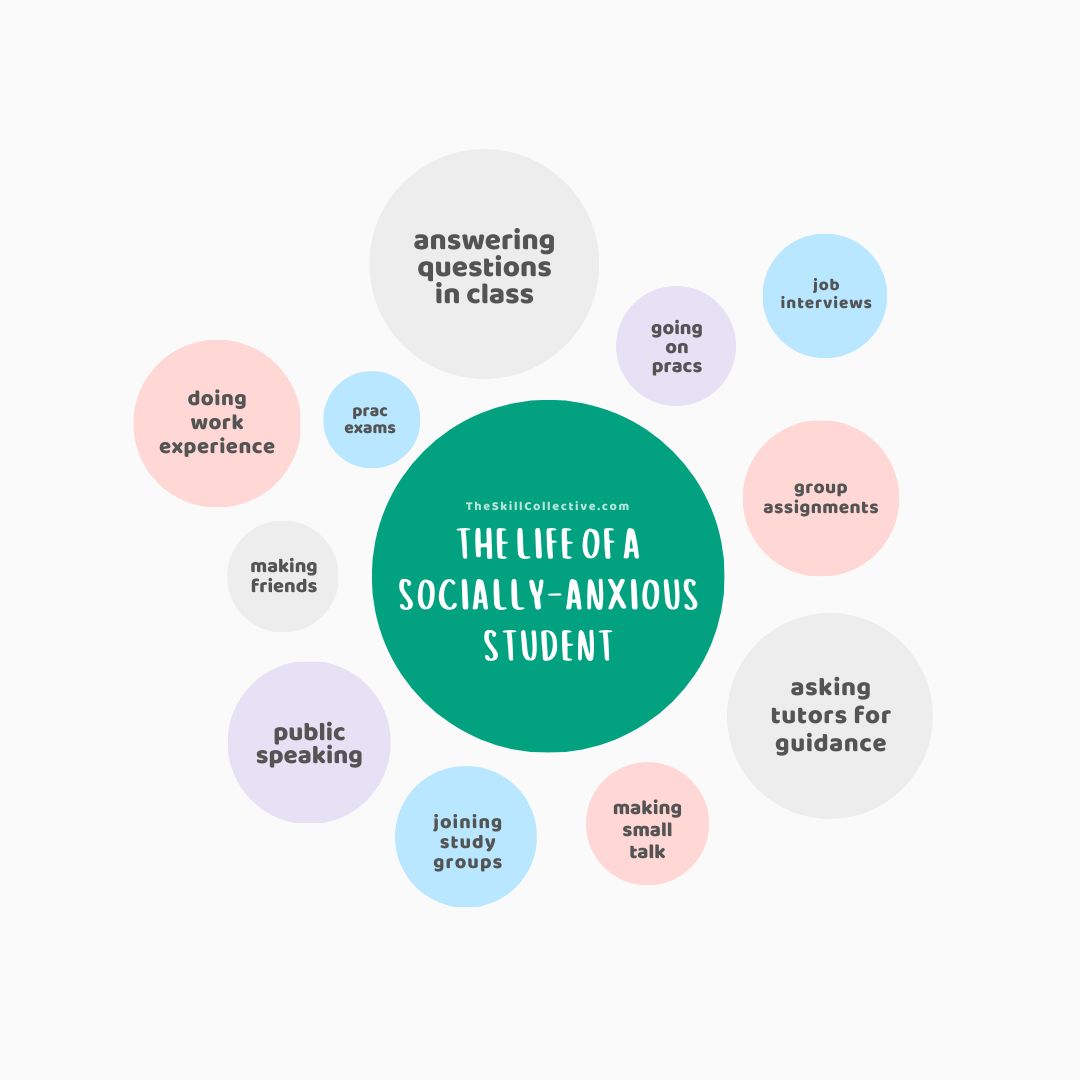WHY COMMUNICATION AND SOCIAL SKILLS MATTER AT UNIVERSITY
This March, for those university students who are starting back or starting for the first time, we’ve put together a month of posts that’ll help you at university and beyond. To kick things off, we’ll look at some really useful social skills that will help you across situations at university and in life.
Why are social skills important to students? Well, whatever type of career that you choose, you will have to communicate effectively with a range of people across a range of situations. For example, a study looking at medical students showed that knowledge of how to ‘read’ a social interaction and respond appropriately predicted academic and job performance years later[1]. Even if you choose a career that seems to have less face-to-face contact, you will likely still come into contact with colleagues, managers, or clients.
Let’s think about some situations where communication and social skills come into play:
COMMUNICATING ‘UPWARDS’ TO THOSE IN AUTHORITY
This can include speaking with your tutors, lecturers, bosses…anyone where you believe the other person is in a position of authority. Socially it’s good to know the type of language to use (more formal vs. less formal, business vs. academic language), learn to request extensions if you need them, and ask questions one-on-one as well as during the tutorial, as well as raising concerns appropriately if you feel you haven’t been treated fairly.
MAKING SMALL TALK
There are so many situations in life where you may find yourself in a position of making small talk. Small talk often comes at the beginning of forming new friendships, when you’re at a party where you don’t know many faces, or even in work situations where you don’t know others yet.
FORMING FRIENDSHIPS AND RELATIONSHIPS
University brings about a whole lot of changes in friendships and relationships, be it making new friends, gaining independence and re-establishing boundaries with your family, and even the changing nature of your existing friendships and relationships. Within your family, as you transition towards adulthood there is increased freedom and responsibility, and this changes the relationship that you have with your parents.
WORKING IN TEAMS
Group assignments aren’t just an exercise in getting the work done but it also throws you into a situation of learning how to work together – a skill that will be needed well beyond university. Working in teams will require learning to negotiate who does what, communicating clearly to meet deadlines, and also providing and receiving peer feedback.
PUBLIC SPEAKING OR PERFORMANCE
Finally, you will be called upon to ‘perform’ in a public setting. This may include doing practical exams in front of assessors, contributing to discussion in your tutorial group, or even do a bit of public speaking in the form of presentations. Beyond university, you may have to deliver work presentations, chair meetings, run through a sales pitch in front of an audience, or even give a speech at a friend’s birthday or wedding.
HOW TO COMMUNICATE BETTER - THE SKILLS THAT MATTER
So, with all the important social and communication tasks that lie ahead of you at university and in life, what are the bedrocks of good communication? Well there’s no one definitive list of the skills that make up good communication, but to keep things actionable here are four great places to start:
LISTENING
Effective listening means being able to stop talking, orient yourself to the person who is speaking, and give them your undivided attention. Here are some quick tips on how to listen effectively:
1. Pay attention to the person who is talking – face them and make eye contact, listen without interrupting, checking your phone, or looking over their shoulder.
2. Pay attention to what is being said, rather than living in your head as to what you’ll say next and waiting for a pause to jump in.
3. Use “encouragers” to show that you are listening. This might be a word, like “uh huh” or “go on” or it might be a gesture, such as nodding the head.
4. Effective listening can include feeding back to the person what you think they have said. This will enable both of you to feel sure that you have really heard the message.
BEING ASSERTIVE
We can all speak, but speaking assertively means being able to communicate your opinion in a way the other person can understand, while at the same time being respectful of the other person’s opinion. Some ideas include:
1. If the message you want to get across is difficult or emotional for you, practice beforehand by rehearsing what you want to say, or even role-play it with a friend.
2. Instead of labelling and blaming the other person, own your own opinions and reactions. So, instead of saying “It’s just like you to be so paranoid and stalk me on Facebook! It’s not like I’m a little kid!” you could try “I feel as though you don’t trust me when you repeatedly check my Facebook page instead of just asking me what my plans are.”
3. Figure out what you want, and then ask for it in a clear and respectful way. Remember, being assertive doesn’t mean you’ll automatically get what you want but it does increase your chances of being heard.
NEGOTIATION + PROBLEM SOLVING
At some point in your studies and in life, you are bound to have a problem or a difference of opinion that requires negotiation. Having good problem solving skills can ensure that molehills don’t turn into mountains. Try to:
1. Clarify the problem. Is it that you need more time to do the assignment, or is it simply that there’s only one textbook in the library and you’re tenth in line to reserve it? Figure out where the crux of the problem is.
2. Brainstorm solutions. There could be more than one, and sometimes the more creative the solution the better. Asking for an extension might be out of the question but requesting to have the textbooks in the reserved section of the library, or photocopying the vital chapter may be much more achievable.
3. Pick a solution and monitor how well the solution is going. So, if the solution was to put the textbook in reserve but the library staff say it takes two weeks to process a request like that, it might be time to go back to brainstorming.
NON-VERBAL COMMUNICATION
So far our tips have all involved speaking or listening. But what about how you use your body to communicate? Past research suggests non-verbal communication plays an important role, for instance only 7% of the information we convey is verbal (the content of what we say), while 55% is visual (body language, eye contact) and 38% is vocal (tone of voice, pacing)[2],[3]. So it pays to think not just about what you say, but how you say it. When you are communicating, consider these points:
1. Think about your audience – a tone of voice that is animated and delivered at a nice, steady pace gives off a very different vibe from a monotonous voice. A monotonous voice can lead to people tuning out. If in doubt, do some research – if public speaking is something you’re concerned about, research some TED talks to see what’s common across ‘good’ speakers. If you’re unsure about making small talk, observe what other people do.
2. Get the right balance with eye contact. Not enough of it and you can seem like you have something to hide or that you’re looking for someone more interesting to talk to. Too much can lead to the other person feeling intimidated. So, look and make eye contact, but don’t stare a person down.
3. Posture is also important. If you want to show that you’re interested and engaged in the conversation, keep an open body stance (i.e. leaning forward, and without crossed arms or legs), and keep fidgeting to a minimum.
THE BOTTOM LINE
Hopefully you’ve found the above communication tips helpful. Remember, it’s just the tip of the iceberg and there’s so much more to learn about in this area to hone your communication skills.
Above all, the great thing about all these skills is that they can all be learnt. You don’t have to be born a great communicator, and it’s never too late to decide to improve. So brush up with these tips and practice, practice, practice! Good communication skills won’t just be an investment for your student days, but for the rest of your life.
Contact us to make an individual appointment if you’d like to start working on building your communication and social skills for your studies.
REFERENCES
[1] Lievens, F., & Sackett, P.R. (2012). The validity of interpersonal skills assessment via situational judgment tests for predicting academic success and job performance. Journal of Applied Psychology, 97, 460-468.
[2] Mehrabian, Albert; Ferris, Susan R. (1967). "Inference of Attitudes from Nonverbal Communication in Two Channels". Journal of Consulting Psychology, 31, 248–252
[3] LaPlante, D., & Ambady, N. (2003). On how things are said. Voice tone, voice intensity, verbal content, and perceptions of politeness. Journal of Language and Social Psychology, 22, 434-441.








The life of a student athlete is truly a busy one, so how can you balance sport with studies without burning out?